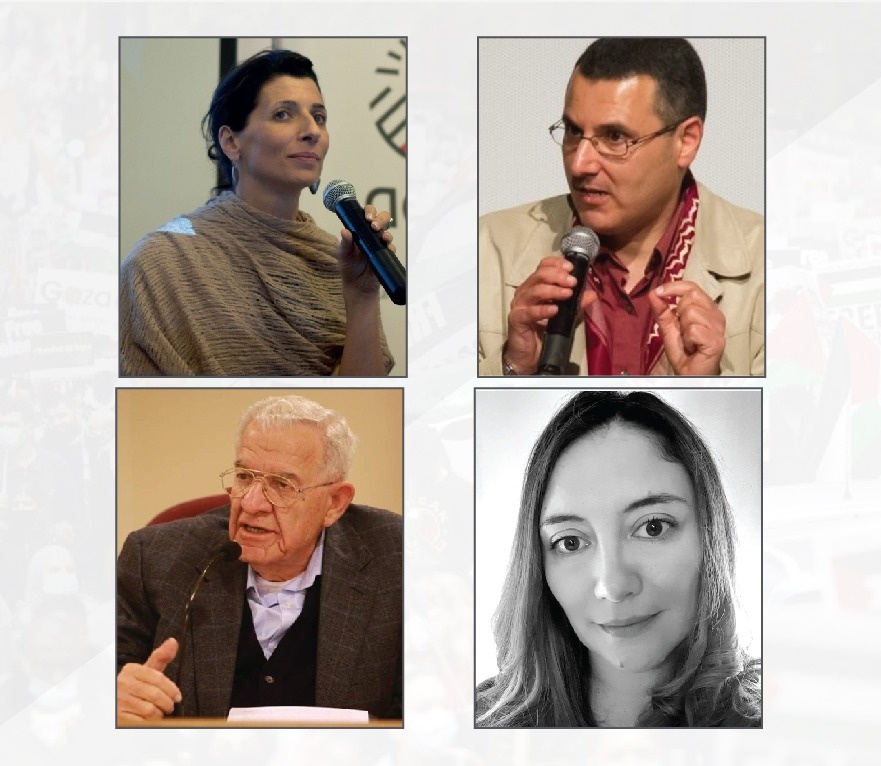As part of its Question of Palestine Program, Arab Renaissance for Democracy and Development (ARDD) held an online webinar titled “Normalization: Responses and Prevention” on Monday, December 6. The webinar sought to unpack the issue of normalized relations with Israel through interventions by keynote speaker Omar Barghouti, co-founder of the Boycott, Divestment, and Sanctions (BDS) movement, and panelists Anis Kassim, an international lawyer based in Amman and chief editor of the Palestine Yearbook of International Law, and Romana Rubeo, an Italian writer and managing editor of The Palestine Chronicle. Francesca Albanese, ARDD’s Question of Palestine program coordinator, moderated the webinar.
Barghouti, Kassim, and Rubeo discussed normalization at micro- and macro-levels, as well as its implications in politics and on the ground. They provided perspectives on what normalization entails for different actors such as civil society and government officials who do not accept normalized relations and walk the path of human rights without falling into discriminatory behaviors.
Omar Barghouti reflected on the stance of Palestinian civil society in opposing “normalization.” Barghouti emphasized the importance of “decolonizing the mind” in the context for any anti-colonial movement and applied the concept to the movement for Palestinian rights. He referred to the BDS movement’s call to resist normalization and said that although the guidelines are not set in stone and can vary on the context, the fight against normalization does not and should not include discriminatory behavior towards Jewish or Israeli individuals, as not all support the oppressive policies Israel imposes on the Palestinians. Rather, he clarified that BDS’ overall aim is to refrain from participating in any event or activity that has received Israeli institutional support until settler-colonialism and apartheid have been dismantled.
In her response, Romano Rubeo delved into Israel’s “art of deception” in which the state attempts to “push an agenda of normalization in the eyes of the international community” at every level” but strives to “maintain its colonial power” on the ground.
She emphasized the “hypocritical” role of the European Union (EU) with regards to normalization; the EU openly condemned the recent aggressions in Gaza, yet it is still a main consumer of Israeli products.
Anis Kassim spoke about the recent “new deal” between the Kingdom of Jordan and Israel regarding solar panels and the desalination plant. He referred to how Israel insisted on using the Dead Sea canal for desalination rather than the Red Sea because the latter would “give Israel equal treatment. According to Kassim, in this case, “normalization with Israel means superiority. It is not a normal relationship between two sovereign states. Israel must have the upper hand.” Kassim underlined that this superiority can also be seen in the Abraham and Oslo Accords.
After interventions by Kassim and Rubeo, Barghouti referred to the regional effects of normalization with Israel. He noted that “Israel’s regime of oppression is not just the enemy of the Palestinians but the enemy of the peoples of the entire region.” Barghouti therefore argued for an intersectional approach to resist or oppose Israel discriminatory policy as a common goal.
Albanese then opened up the discussion to participants. Renowned journalist Lamis Andoni emphasized the role of BDS in combatting the colonizer’s helplessness against colonizers and the importance of pointing out each success to revitalize hope amongst the Palestinian people. She spoke about the dangers of Jordan tying economic resources to Israel and putting energy security and water security under the control of Israel. Another participant from the floor referred to the recent deal with Jordan and asked how civil society can affect change when normalization happens at the higher political level. Barghouti praised Jordanians in particular, saying that “the work done on the streets of Jordan is heroic. A huge cross section of society has come out against the deal.” He referred to the success of Egyptian public protesting normalization with Israel as an example for other countries to follow but noted that this is not feasible in some Arab countries with a strong military presence.
In concluding remarks, Barghouti, Kassim, and Rubeo spoke about positive next steps. Barghouti remarked that the “most important task is to fight hopelessness and insist on hope… we can, and we are changing reality.” Kassim concluded that the role of BDS is one of the only meaningful struggles left and deserves support as it is not only “ethical but also a legal movement that complies with international laws of self-defense in defending the rights of the occupied and colonized people.”



